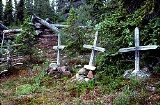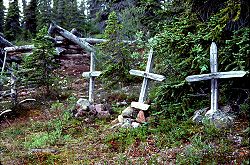
John Hornby
Encyclopedia
John Hornby was an English
explorer best known for his expedition
s in the Arctic
region, notably in the "barren lands" in the Northwest Territory
of Canada
. Hornby was born to a wealthy family in England and migrated to Canada in 1904.
Hornby's first trip to the Arctic was to the Great Bear Lake
region in 1908 and he developed a strong fascination with the Canadian Arctic wilderness. Apart from occasional trips to Edmonton and service in World War I, Hornby would spend the rest of his life in the Arctic region of northern Canada
.
He became known as the "hermit of the north" for his efforts to live off the land with limited supplies. In 1923, Hornby would team up with an Englishman James Critchell Bullock (1898-1953) in efforts to spend an entire year in the Arctic near Hudson Bay
living off the land without supplies except for weapons. The pair barely survived and Critchell Bullock's diaries formed the basis of Malcolm Waldron's
book Snow Man: John Hornby in the Barren Lands first published in 1931.
 In 1926, Hornby tried to spend a year in a spot by the Thelon River
In 1926, Hornby tried to spend a year in a spot by the Thelon River
with his 18 year old cousin Edgar Christian
and another young man Harold Adlard. Unfortunately, the trio missed the caribou
migration southward and therefore lacked sufficient food to survive the winter. Hornby died of starvation along with his companions in 1927. The graves of the three men can be found by the Thelon River.
Hornby recommended in a report following his expedition with Critchell-Bullock that the areas near the Thelon and Hanbury Rivers be created as a wildlife sanctuary. The Thelon Game Sanctuary was established in 1927, renamed Thelon Wildlife Sanctuary
in 1956, and this area remains the heart of the largest area of wilderness in North America. The publication of Waldron's book proved successful and sparked further interest in the Northern wilderness.
England
England is a country that is part of the United Kingdom. It shares land borders with Scotland to the north and Wales to the west; the Irish Sea is to the north west, the Celtic Sea to the south west, with the North Sea to the east and the English Channel to the south separating it from continental...
explorer best known for his expedition
Exploration
Exploration is the act of searching or traveling around a terrain for the purpose of discovery of resources or information. Exploration occurs in all non-sessile animal species, including humans...
s in the Arctic
Arctic
The Arctic is a region located at the northern-most part of the Earth. The Arctic consists of the Arctic Ocean and parts of Canada, Russia, Greenland, the United States, Norway, Sweden, Finland, and Iceland. The Arctic region consists of a vast, ice-covered ocean, surrounded by treeless permafrost...
region, notably in the "barren lands" in the Northwest Territory
Northwest Territory
The Territory Northwest of the River Ohio, more commonly known as the Northwest Territory, was an organized incorporated territory of the United States that existed from July 13, 1787, until March 1, 1803, when the southeastern portion of the territory was admitted to the Union as the state of Ohio...
of Canada
Canada
Canada is a North American country consisting of ten provinces and three territories. Located in the northern part of the continent, it extends from the Atlantic Ocean in the east to the Pacific Ocean in the west, and northward into the Arctic Ocean...
. Hornby was born to a wealthy family in England and migrated to Canada in 1904.
Hornby's first trip to the Arctic was to the Great Bear Lake
Great Bear Lake
Great Bear Lake is the largest lake entirely within Canada , the third or fourth largest in North America, and the seventh or eighth largest in the world...
region in 1908 and he developed a strong fascination with the Canadian Arctic wilderness. Apart from occasional trips to Edmonton and service in World War I, Hornby would spend the rest of his life in the Arctic region of northern Canada
Northern Canada
Northern Canada, colloquially the North, is the vast northernmost region of Canada variously defined by geography and politics. Politically, the term refers to the three territories of Canada: Yukon, Northwest Territories, and Nunavut...
.
He became known as the "hermit of the north" for his efforts to live off the land with limited supplies. In 1923, Hornby would team up with an Englishman James Critchell Bullock (1898-1953) in efforts to spend an entire year in the Arctic near Hudson Bay
Hudson Bay
Hudson Bay , sometimes called Hudson's Bay, is a large body of saltwater in northeastern Canada. It drains a very large area, about , that includes parts of Ontario, Quebec, Saskatchewan, Alberta, most of Manitoba, southeastern Nunavut, as well as parts of North Dakota, South Dakota, Minnesota,...
living off the land without supplies except for weapons. The pair barely survived and Critchell Bullock's diaries formed the basis of Malcolm Waldron's
Malcolm Waldron
Malcolm Waldron born 6 September 1956 is a former footballer who played for various clubs, including Southampton and Portsmouth. He played as a Centre back during the late 1970s and early 1980s.-Southampton:...
book Snow Man: John Hornby in the Barren Lands first published in 1931.

Thelon River
The Thelon River stretches across northern Canada. Its source is Whitefish Lake in the Northwest Territories, and it flows east to Baker Lake in Nunavut. The Thelon ultimately drains into Hudson Bay at Chesterfield Inlet.-Geography:...
with his 18 year old cousin Edgar Christian
Edgar Christian
Edgar Christian was born on 6 June 1908, the son of Lt Col Frank Christian RA.He attended prep school at the Grange School, Shorncliffe Road, Folkestone and hoped to follow his brother Charles to Marlborough College; in the end he went on to Dover College which was more local, despite the fact the...
and another young man Harold Adlard. Unfortunately, the trio missed the caribou
Barren-ground Caribou
Barren-ground Caribou is a subspecies of the caribou that is found mainly in the Canadian territories Nunavut and the Northwest Territories and western Greenland. It sometimes includes the similar porcupine caribou, in which case the barren-ground caribou also is found in Alaska...
migration southward and therefore lacked sufficient food to survive the winter. Hornby died of starvation along with his companions in 1927. The graves of the three men can be found by the Thelon River.
Hornby recommended in a report following his expedition with Critchell-Bullock that the areas near the Thelon and Hanbury Rivers be created as a wildlife sanctuary. The Thelon Game Sanctuary was established in 1927, renamed Thelon Wildlife Sanctuary
Thelon Wildlife Sanctuary
The Thelon Wildlife Sanctuary, at , over twice the area of Belgium, is the largest wildlife refuge in Canada. It is located in northern Canada's Arctic region, north of the tree line, straddling the Northwest Territories and Nunavut, halfway between Baker Lake and Yellowknife, and bordered on the...
in 1956, and this area remains the heart of the largest area of wilderness in North America. The publication of Waldron's book proved successful and sparked further interest in the Northern wilderness.
Further reading
- Pierre Berton, "Prisoners of the North", Anchor Canada, 2005
- Malcolm Waldron, Snow Man: John Hornby in the Barren Lands, Kodansha America 1997 reprint (originally published in 1931).
- George Erickson, True North. Toronto: Thomas Allen, 2000
- George WhalleyGeorge WhalleyGeorge Whalley was a scholar, poet, naval officer and secret intelligence agent during World War II, CBC broadcaster, musician, biographer, and translator. He taught English at Queen's University in Kingston, Ontario and was twice the head of the department. He was elected to the Royal Society...
, The Legend of John Hornby. Toronto: Macmillan of Canada, 1962. - George Whalley, Death in the Barren Ground. Ottawa: Oberon Press, 1980.
- Clive Powell-Williams, Cold Burial: A Journey into the Wilderness. London: Viking, 2001.
- Elizabeth Hay, Late Nights on Air. Toronto: McClelland & Stewart, 2007.
External references
- Institute of North America review of Snow Man: John Hornby in the Barren Lands
- University of Calgary summary of 1984 Arctic article on John Hornby
- Information on Snow Man: John Hornby in the Barren Lands
- Insect biodiversity in the Thelon Wildlife Sanctuary. Newsletter of the Biological Survey of Canada (Terrestrial Arthropods) 21(2) 2002.
- "Please don't blame dear Jack" (well-documented article discussing the possible homosexual nature of the relationship between John Horby and Edgar Christian)
- 1927 John Hornby NWT Historical Timeline, Prince of Wales Northern heritage Centre
- Sherborne School Archives – holds the papers of Captain J.C. Critchell Bullock, including the diaries of John Hornby

